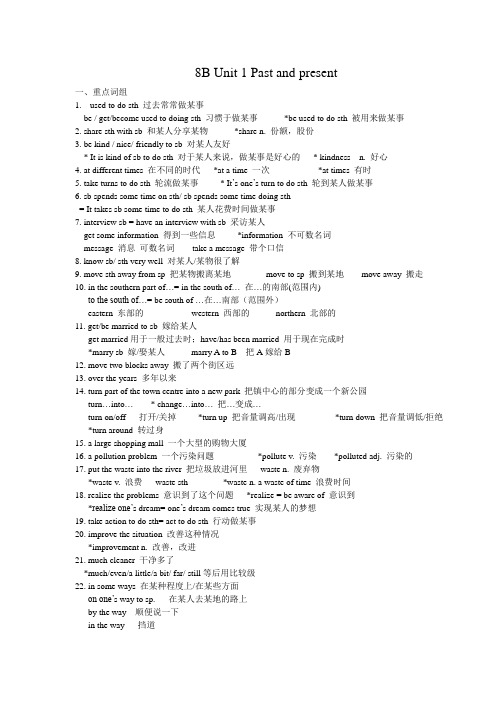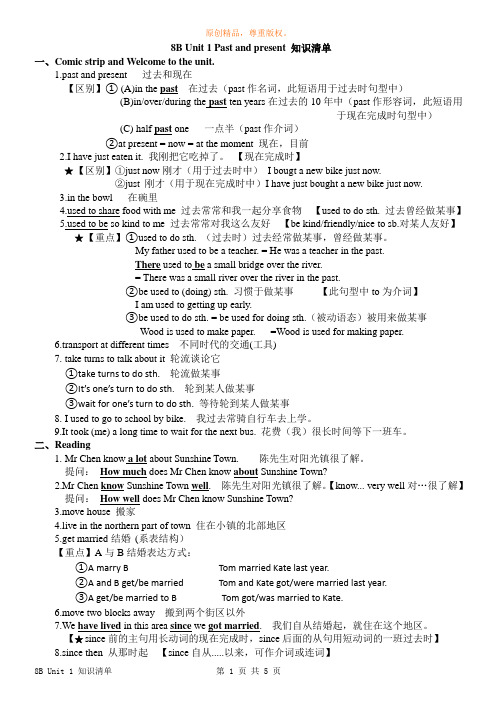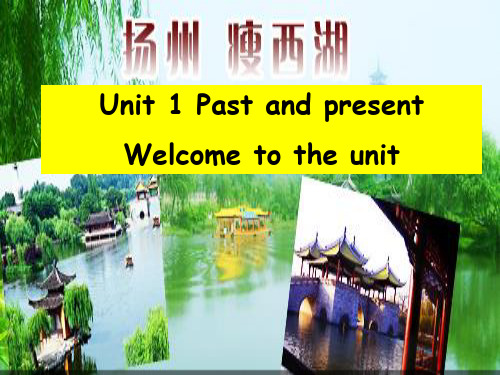苏教版英语8B-unit1-past-and-present知识点梳理
8B Unit 1 Past and present

8B Unit 1 Past and present一、重点词组ed to do sth 过去常常做某事be / get/become used to doing sth 习惯于做某事*be used to do sth 被用来做某事2. share sth with sb 和某人分享某物*share n. 份额,股份3. be kind / nice/ friendly to sb 对某人友好* It is kind of sb to do sth 对于某人来说,做某事是好心的* kindness n. 好心4. at different times 在不同的时代*at a time 一次*at times 有时5. take turns to do sth 轮流做某事* It’s one’s turn to do sth 轮到某人做某事6. sb spends some time on sth/ sb spends some time doing sth= It takes sb some time to do sth 某人花费时间做某事7. interview sb = have an interview with sb 采访某人get some information 得到一些信息*information 不可数名词message 消息可数名词take a message 带个口信8. know sb/ sth very well 对某人/某物很了解9. move sth away from sp 把某物搬离某地move to sp 搬到某地move away 搬走10. in the southern part of…= in the south of…在…的南部(范围内)to the south of…= be south of …在…南部(范围外)eastern 东部的western 西部的northern 北部的11. get/be married to sb 嫁给某人get married用于一般过去时;have/has been married 用于现在完成时*marry sb 嫁/娶某人marry A to B 把A嫁给B12. move two blocks away 搬了两个街区远13. over the years 多年以来14. turn part of the town centre into a new park 把镇中心的部分变成一个新公园turn…into…* change…into…把…变成…turn on/off 打开/关掉*turn up 把音量调高/出现*turn down 把音量调低/拒绝*turn around 转过身15. a large shopping mall 一个大型的购物大厦16. a pollution problem 一个污染问题*pollute v. 污染*polluted adj. 污染的17. put the waste into the river 把垃圾放进河里waste n. 废弃物*waste v. 浪费waste sth *waste n. a waste of time 浪费时间18. realize the problems 意识到了这个问题*realize = be aware of 意识到*realize one’s dream= one’s dream comes true 实现某人的梦想19. take action to do sth= act to do sth 行动做某事20. improve the situation 改善这种情况*improvement n. 改善,改进21. much cleaner 干净多了*much/even/a little/a bit/ far/ still等后用比较级22. in some ways 在某种程度上/在某些方面on one’s way to sp. 在某人去某地的路上by the way 顺便说一下in the way 挡道in any way 在任何方面in this way 以这种方式23. most of my old friends 我的大部分老朋友most friends 大多数朋友24. so often as before 和以前一样经常地as…. as 和…一样not as/so…as 不如24. play cards and Chinese chess 打牌和下中国象棋play+乐器类单词play+球类/棋牌类单词play with 玩具类单词25、feel a bit lonely感到有点儿孤独(寂寞)live alone 独自居住*alone= by oneself= on one’s own 独自*a lonely village 一个偏僻的村庄26、from time to time = sometimes= at times有时27、because of + n. / v-ing 因为because后跟原因状语从句28、know little about sth. 对……知之甚少a few 一些后跟复数few 几乎没有+复数a little 一点儿后跟不可数名词little 几乎没有+不可数名词29、take place / happen 发生(没有被动语态)*break out 爆发(没有被动语态)*run out 用光(没有被动语态)30、all one’s life一生,一辈子,终生31、over the past century在过去的一个世纪里32、hear about …听说关于……hear of 听说hear from 收到某人的来信33、living conditions 居住条件living area 生活区域*living adj. 活的*live, alive, living,lively的区别1)alive 意为“活着”,侧重说明生与死之间的界限,既可指人,也可指物;可用来作表语,后置定语或宾补。
8B Unit 1 Past and present知识清单

8B Unit 1 Past and present 知识清单一、Comic strip and Welcome to the unit.1.past and present 过去和现在【区别】① (A)in the past在过去(past作名词,此短语用于过去时句型中)(B)in/over/during the past ten years在过去的10年中(past作形容词,此短语用于现在完成时句型中)(C) half past one 一点半(past作介词)②at present = now = at the moment 现在,目前2.I have just eaten it. 我刚把它吃掉了。
【现在完成时】★【区别】①just now刚才(用于过去时中)I bougt a new bike just now.②just 刚才(用于现在完成时中)I have just bought a new bike just now.3.in the bowl 在碗里ed to share food with me 过去常常和我一起分享食物【used to do sth. 过去曾经做某事】ed to be so kind to me 过去常常对我这么友好【be kind/friendly/nice to sb.对某人友好】★【重点】①used to do sth. (过去时)过去经常做某事,曾经做某事。
My father used to be a teacher. = He was a teacher in the past.There used to be a small bridge over the river.= There was a small river over the river in the past.②be used to (doing) sth. 习惯于做某事【此句型中to为介词】I am used to getting up early.③be used to do sth. = be used for doing sth.(被动语态)被用来做某事Wood is used to make paper. =Wood is used for making paper.6.transport at different times 不同时代的交通(工具)7. take turns to talk about it 轮流谈论它①take turns to do sth. 轮流做某事②It’s one’s turn to do sth. 轮到某人做某事③wait for one’s turn to do sth. 等待轮到某人做某事8. I used to go to school by bike. 我过去常骑自行车去上学。
8BUnit 1 past and present短语

8B Unit1 词组1. not…any more = no more // not …any longer = no longer 不再,再也不……2. in the past 在过去3. in /during/over the past few years 在过去的几年时间里4. at present 在现在5. in the centre of town = in the town centre 在镇中心6. It’s pleasant to do sth 干某事很高兴7. do a history project on the changes 做一个有关于变迁的历史课题8. the changes to/in Sunshine Town 阳光镇的变化9. transport at different times 不同时代的交通工具10. interview sb to get some information. 采访某人以获取一些信息11. ask sb for help 向某人求助12. move house 搬家13. since then 从那时起14. move to another flat in the centre of the town with my family和我家人搬到镇中心的另一所公寓15. be // get married to sb= marry sb 和某人结婚16. be// get married 结婚17. for example 例如18. live in the southern part of town together till 1965 一起在镇的南部住到1965年19. as often as before 像以前一样经常/频繁20. market stalls 零售货摊21. turn/change the place into a post office 把这地方变成邮电局22. play cards and Chinese chess at weekends 在周末打牌下中国象棋23. reduce water pollution 减少水污染24. a shoe factory\ shoe factories 一家鞋厂/鞋厂25. used to dump its waste into the river 过去经常把它的废水倒入河里26. the poison in the waste polluted the river 废弃物里的毒药污染河流27. The government realized it was a very serious problem政府意识到它是一个非常严重的问题28. take action to protect the environment 采取措施保护环境29. in some ways 在某些方面30. have open space and pretty gardens 拥有开放的空间和漂亮的花园31. become more difficult to see some of my old friends 看望我的老朋友变得更困难32. feel a bit /a little lonely from time to time 不时地感到有点孤独33. move next to the park 搬到公园隔壁34. move out of //into --- 搬出……// 搬进---35. throw away something// throw it away 扔走某东西36. hear from sb. = get/receive a letter from sb. 收到某人的来信37. have an interview with sb /interview sb 对某人进行一次采访38. tell me a lot about his past and present 告诉我很多有关他过去和现在的事39. the history of the town 小镇的历史40. miss his old friends 想念他的老朋友41. be lucky enough to do sth 足够幸运地干某事42. hear about the future plan 听说这未来计划43. enjoy the exhibition 喜欢展览44. in fact 实际上45. a place of natural beauty 一个自然美的地方46. borrow sth from sb 向某人借某物lend sth to sb 把某物借给某人47. be in service = be in use 被使用48. in primary school 在小学里49. on one's own /alone/ by oneself 独自50. have time to relax more 有时间去更多的放松51. have more free time 有更多的空闲时间52. have the same feeling as you 和你有同样的感受53. stay after school to chat with friends 放学后留下来和朋友聊天54. many buses pass the town 许多公共汽车经过镇55. bring many advantages 带来许多好处(优势)56. bring them a modern life 给他们带来一种现代化的生活57. the title of your report …你报告的题目58. get lost = be lost = lose one's way 迷路59. become a new tourist attraction 成为一个新的旅游景点60. next to the clock tower 在钟楼的旁边61. a few/ several times 几次62. repair over ten bicycles 修了十多辆自行车63. at the history museum 在历史博物馆64. decide to do sth / make up one’s mind to do sth 决定做某事65. travel by plane 乘飞机旅行66. look up the word in the dictionary 在字典里查单词67. cause many problems for people 给人们产生许多的问题68. by the way 顺便问一下69. own a boat 拥有一艘船70. show sb how to do sth. 示范给某人看如何做某事71. the best model I have ever seen 我曾经所见过的最好的模型72.fresh air 新鲜空气73. lose my map 丢了我的地图74. a recent report / photo 最近的报道/照片。
江苏新教材牛津英语八年级下 Unit1 Past and present Welcome to the unit

Listen and answer
1. Does Hobo think Eddie has changed? Why? Yes. Because he used to share food with him.
Listen and answer
2. What was in the bowl an hour ago? Hobo’s food .
2. 技能目标: 1)了解北京不同时代的交通工具。 2)谈论自己、家人和朋友过去和现在使用的 不同交通工具。 3)初步认识现在完成时。 3. 情感目标:通过交通方式的变化,了解并 体会北京的巨大变化。
Lead-in
Happy New Year, boys and girls! We’re glad to be back at school again. You are one year older and you’re taller. All of you have changed.
Unit 1 Past and present Welcome to the unit
1.知识目标: 学习词汇:past , present, just 学习词组: used to do sth, Share sth with sb, go to school, by bike, take a bus 学习句子: You used to share food with me! It took a long time to wait for the next one.
Homework 1. Recite the sentences of the comic pictures. 2. 翻译下列词组 1)在碗中 2)过去常常 3)和……一起分享 4)家乡 5)在不同的时代 6)在过去的二十年中 7)北京的变化 8)一项历史项目
8BUnit1知识点归纳

14. factory a place where things are made by machines 工厂 (factories)
a steel/car factory 一家钢铁/汽车厂 two shoe factories 两家鞋厂
15. waste 废料;废品浪费
The knife is used for cutting apples. be/become/get used to sth习惯于某事, be/become/get used to doing sth习惯于做某事
Tom is used to getting up early. Tom习惯于早起。
The old man isn’t used to the city life. 这个老人不习惯城市生活。
He used to get up late, so he isn’t used to getting up early. 他过去经常起的晚,所以他不习惯早起
The life we were used to has changed a lot. 我们过去习惯了的生活已经改变了许多。
5. since 自…以来
1. past 名词过去 2. In the past 在过去
3. There was a cinema in this area in the past. 4. 过去这儿有一个电影院。 5. In the past two years在过去的两年中(用于完成
时)
6. Great changes have taken place in my hometown in the past two years.
18. situation 形势,情况
8B Unit 1 Past and present语法词组总结

8B Unit 1 Past and presentGrammarⅠPresent perfect tense一、现在完成时谓语动词的定义:A.现在完成时态表示动作开始于过去某一时刻,一直延续到现在,或可能还要继续下去。
e.g. 1.He has lived here since 1978. 自从1978年以来,他一直住在这儿。
(动作起始于1978年,一直住到现在,可能还要继续住下去。
)B.现在完成时态表示动作发生在过去某一时刻并已结束,但该动作对现在产生了影响,与现在情况具有因果关系。
e.g. 1.He has turned off the light.他已把灯关了。
( 动作结束于过去,但说明的是现在的情况--灯现在不亮了。
)二、现在完成时谓语动词的构成:have/has+ved (其中have/has为助动词,ved为动词的过去分词。
)e.g . I have finished the composition already.四、过去分词的构成1、直接加–ed looked watched2、以不发音的e结尾的,加–d changed moved3、以辅音字母加y结尾的,变y为i,加-ed studied carried4、重读闭音节,一元加一辅,双写辅音字母,加-ed planned dropped★现在完成时与一般过去时的区别1. 一般过去时表示过去某个时间发生的事、存在的状态或经常发生的动作说话的侧重点只在于陈述一件过去的事情,不强调对"现在"产生的影响。
如:He visited Guilin in 1998.他1998年参观过桂林。
(只说明去桂林的时间)2. 现在完成时表示动作发生在过去,对现在造成了影响或产生了结果。
不与确定的过去时间状语连用。
如:Jill has bought a new computer.吉尔买了一台新电脑。
(着重点是现在有了一台新电脑)3. 两种时态的区分(1)一般过去时的谓语动词用过去式,而现在完成时的谓语基本构成是“助动词have /has +过去分词”。
8BUnit1Past and present重点句型
Unit 1 Past and present (现在完成时I)W: 1. He used to travel by bike in the past. (by不是动词,后面跟抽象化的方式,所以没有冠词)2. It took us a long time to wait for the next bus. (区别spend、pay、take和cost)R: 3. He has lived in the northern part of the town center since he got married.4. Has her husband changed a lot over the years?5. The waste and pollution from the steel factories are turning the blocksinto a dirty area.6. Later the government realized the problem and took action to improvethe situation.7. In some ways, the life is much better than before. However, it hasbecome impossible for them to see each other as often as before.(much修饰比较级、as... as结构该复习了)8. Does he feel a bit lonely from time to time?G: 9. -- Have you watched the amazing interviews about environment on TV recently? -- Not yet.I: 10. She went abroad last year and has just returned from the USA. 11. – How do you keep in touch with each other under such conditions?-- We mainly communicate by email.12. -- Does the Internet make communication much easier? (much+比较级;much easier做补语)-- Yes. Exactly.13. Have you got used to the open space since you moved to thecountryside(U2生词)?14. How many changes have taken place in your hometown?掌握下列动词的过去式和过去分词:fit ______ _______ plan ______ _______ hit ______ ______ put ______ ______meet ______ ______ make ______ _______ eat _____ _____ sell ______ _______give ______ ______ write ______ ________ think ________ ________carry _______ ________ catch ________ _________ lend ________ ________forget ________ _________ fall _______ _________ draw _______ ________。
苏教版中考英语复习各单元要点8B_U1(最新整理)
(牛津初中英语总复习)8B Unit 1一.【精选词汇】 ㈠重点短语 1. the changes to Sunshine Town阳光镇的变化→the changes to… …的变化(p8) 〈知识链接〉change n.变化,常用复数changes。
e.g. Great changes have taken place since 1995. 2. in the southern part of town →in the southern part of…在…的南部→south→southern 〈知识链接〉east东部→eastern东部的, west →western, north →northern 3. in the past在过去→at present现在→in the future未来;将来,注意这些短语中的介词和冠词。
4. turn the place into a park →turn…into…把…变成… 〈知识链接〉①Heat turns water into vapor.热使水变成蒸气。
②Turn this sentence into English. 5. play cards and Chinese chess打牌、下象棋,e.g. It’s pleasant to play cards and Chinese chess. 6. water pollution水污染→air pollution空气污染,noise pollution噪音污染(p9) 〈知识链接〉Water pollution was a problem before. 7. used to dump its waste into water →used to do sth过去常做某事,注意否定式、疑问式的形式 〈知识链接〉⑴used to do sth →否定式used not to do sth或didn’t use to do sth→疑问式Didsb use to do sth?或Used sb to do sth? ⑵There be和used to合用的形式为There used to be。
江苏新教材牛津英语八年级下 Unit1 Past and present Grammar
More practice
hasn’t finished (not finish) the 1. He ______________
homework yet. He will try to finish it
quickly. 2. My family ________ has lived (live) in Nanjing since 1996. 3. _____ ______ (know) him since Have you known then?
over the past century. From this have learnt (learn) film, I (4)______________ more about Beijing’s past and
present. have heard Sandy: Oh, I think I (5)__________(hear) about the film. Do you plan to see it again? Millie: Yes, I’d like to.
7. My father went to Beijing two weeks haven’t seen (not see) him since ago. I____________ then. 8. ____ Has Tom _______ written (write) letters to you recently? 9. Jack’s mother isn’t at home. She ________ has gone (go) to the supermarket.
3. 现在完成时的一般疑问句
句型 Have/Has+主语+过去分词 Have you….? Yes, I have. No, I haven’t. Has he….? Yes, he has. No, he hasn’t.
苏教版译林牛津英语8B单词表(含音标精编版)
tiny
'taɪnɪ
adj.极小的
18
fall over
摔倒
19
continue
kən'tɪnju:
vi.&vt.继续
20
either
ˈaɪðə(r)
adv.也
21
manage
'mænɪdʒ
vi.&vt.设法完成;管理
22
lift
lɪft
vt.举起,抬高;提高
23
army
'ɑ:mɪ
n.大批,大群
ˈgæðə(r)
*vi.&vt.聚集,集合
54
darkness
'dɑ:knəs
*n.黑暗
55
lawn
lɔ:n
*n.草坪
56
musical
ˈmju:zikəl
*n.音乐剧
57
sail
seɪl
*n.帆
8B Unit4A good read单词
序号
英文
音标
中文
1
read
ri:d
n.读物
2
cooking
ˈkʊkɪŋ
rɪ'məʊt kən'trəʊl
*n.遥控器
48
ah
ɑ:
*excl.(表示惊奇,高兴等)啊
49
channel
'tʃænl
*n.频道
50
word processing
wə:d prəʊˈsesɪŋ
*n.文字处理
51
icon
'aɪkɒn
*n.图标
52
click
- 1、下载文档前请自行甄别文档内容的完整性,平台不提供额外的编辑、内容补充、找答案等附加服务。
- 2、"仅部分预览"的文档,不可在线预览部分如存在完整性等问题,可反馈申请退款(可完整预览的文档不适用该条件!)。
- 3、如文档侵犯您的权益,请联系客服反馈,我们会尽快为您处理(人工客服工作时间:9:00-18:30)。
8B unit1 past and present标题解析:Past and present(1)past 做名词,表示“过去,往昔”in the past 在过去,从前=years agoPast 做形容词,表示”过去的“,in the past few years在过去的几年当中Past 做副词,表示”经过,过去“,walk past the house, drive past the post office 走过...;驶过...Past 做介词,表示”超过,在...之后“,ten past seven, 7点10分辨析:past/passpast做介词,跟动词连用,如run past, walk past, hurry past, drive past...不能单独使用表示经过Pass做动词,直接跟宾语,如pass the house, pass the supermarket; 此外,pass当动词表示“递给”pass me the salt 例题:When I walked the playground, I saw a lot of boys there.A.Past; play footballB.Passed; playing footballC.Past; playing footballD.Passed; play football(2)Present 做名词,表示“现在”,at present现在=nowPresent 做名词,表示“礼物”,buy sb. a present=buy a present for sb.Present 做形容词,表示“现在的,目前的”,the present condition 目前的状态the present day当代的例题:汉译英他们经常谈论过去,现在和将来。
请访问我们的网站,来购买特别的礼物。
一.词汇拓展1.marry v. →married (adj.) 已婚的2. communicate v. →communication (n.)3. north n. →northern (adj.)4. wife n. →wives(复数)5. interview v. →interviewer (n.) 采访者6.recent adj. →recently (adv.)7.exact adj. →exactly (adv.)8.pollute v. →pollution(n.)二.重点短语1.和某人分享某物2.对某人好3.不同时期的交通工具4.阳光镇的变化5.非常了解这个地方不太了解那个地方6.从那时起自从2005年以来自从去年以来自从三个星期前以来7.搬家搬到南京搬走搬出搬进一座新公寓搬到两个街区以外8.在…南部9.结婚10.变化很大变成change n.改变(可数)找零,零钱(不可数)11.在过去在现在12.这些年以来13.把…变成翻到14.打牌下中国象棋15.简单快捷16.花费时间做某事17.水污染噪音污染减少污染18.过去经常做某事19.像以前一样经常地20.把…扔进21.一个很严重的问题22.采取行动做某事23.在某种程度上顺便问一下在去…的路上挡路24.开阔的空间/ 户外活动场所25.不时地,偶尔26. 一处自然景点地方27.从…借…借给某人…/把…借给…28.在使用中29.带…去…30.独自地31.居住环境32.清新的空气33.和他的父母一起出国37.保持联系38.近期照片recent 在近几年中39. 通过email交流40.使交流简单41. 在镇中心三.重点句子1.-Eddie,have you seen my food ? ----Yes. I’ve just eaten it.Just 表示“刚刚”,表示刚刚发生的事情,用于现在完成时态。
辨析:just/just now/just then/right nowJust:刚刚,用在现在完成时态如:我刚刚完成作业。
Just now: 刚才,用在一般过去时态如:我刚才在花园里找到了手表。
Just then: 就在那时,用于一般过去时态如:就在那时,车祸发生了。
Right now: 现在=now, at present, at the moment, 用于一般现在或者现在进行时如:他们正在做一个历史课题。
.2.You’ve eaten my food? 陈述式疑问句,常用在口语当中,表示对某件事情的把握比较大,但是需要对方证实一下,结构仍然用陈述句,在句末加上问号。
如:你已经去过老师的办公室了吗?老师对你说什么了?.3. You used to share food with me!辨析:used to do/be used to do/be used to doing /get used to doing(1)used to do表示过去常常做某事而现在不再做了,只有过去时态,变否定为didn’t use to do/usedn’t to do;一般疑问句也有两种形式。
(2)Be used to do sth. 表示被用来做某事,be 动词形式根据具体时态来定,如:wood is used to make tables.(3)Be used to sth./doing sth. 表示习惯于(做)某事,常与一般现在时态和现在完成时态连用。
如:My sister is used to the new school now.My sister has already been used to studying in the new school.注意,如果表示习惯于做某事,动词一定要用ing形式。
如:他已经习惯了在新环境里生活。
.(4)Get used to (doing) sth. 习惯于做某事比较侧重动作。
例题:--Do you remember there a river here?--Of course. I often swam in it when I was young.A. used to beingB. used to beC. was used to beD. was used to being4. Why didn’t you take a bus?=why not take a bus?表示乘坐交通工具的方法:(1)by+交通工具名称,如:by car/bus/boat/plane/bike... on foot(2)By+地理名词,表示“通过...的途径”,如:by water(走水路),by sea (走海路),by air(=by plane)(3)Take +限定词+交通工具,如:take a bus, take a train(4)In+限定词+全封闭交通工具,如:in a taxi/car/plane(5)On+限定词+开放式或半封闭的交通工具,如:on a bike5. There were always too many people on the bus, and it took a long time to wait for the next one.(1)辨析:too many/too much/much tootoo many 太多,修饰可数名词复数,too many books, too many fanstoo much 太多,修饰不可数名词,too much time, too much money, too much homeworkmuch too 太,修饰形容词,much too busy, much too noisy(2)On the bus 在公交上get on/off the bus 上/下公交车(3)It takes +时间段+to do sth. =sb. spend +时间段+doing sth. 花费时间做某事如:她花了一天的时间读完了这本有趣的故事书。
(4)Wait for sth./sb.等某人、某物如:快点,Bobby正在大门口等你。
等不及/迫不及待做某事:can not/hardly wait我迫不及待的想参加这个活动: .(5)One替代可数名词单数。
6.When I got married in 1965, my wife and I moved two blocks away and we’ve lived in this area since then.= A= There 这些年,镇子已经发生了很大的变化。
8.There was once a steel factory near the Sunshine River. Once曾经=9. Later the government realized the problem and took action to improve the situation.(1) Realize the problem意识到这个问题Realize: Vt. 意识到意识到环境保护的重要性意识到我错了知道现在我才意识到保护环境的重要性Vt. 实现realize my dream 实现梦想(2) Take action 采取行动action 是不可数名词,前面不加冠词我们必须尽早采取行动.(3)Improve the situation 改善情况改善生活10. In some ways it is. 嗯,在某些方面是这样的。
In some ways 在某些方面,在某种程度上例句:就某事而言,这是个不错的主意。
在某些方面,火星上的生活未必会好于地球上的生活。
11.It’ll really nice to have a beautiful modern town.It’s been impossible for us to see each other as often as possible.这两个结构都采用It’s +形容词+(for sb.)to do sth.的结构。
注意与It’s +形容词+of sb. to do sth.区别。
四.词义辨析:1. lonely和alone(1)lonely 为形容词,修饰人表示“孤独的;寂寞的”;修饰地方表示“无人烟的,荒凉的”。
过着孤单的生活一位孤独的老人感到孤独一座荒岛(2)alone 作形容词,意为“单独的,独自的;独一无二的”,只作表语。
他独自在家里。
I am not alone in thinking so.(3)alone 还可作副词,意为“单独地,独自地”。
他独自回家了。
2.happen和take placehappen与take place两者都作“发生”讲,都不能用于被动语态,但它们之间也有差别。
